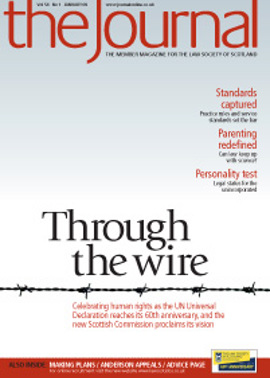Website review

Scottish Parliamentary
Standards Commissioner
The Scottish Parliamentary Standards Commissioner (currently Dr Jim Dyer OBE) investigates complaints that an MSP has broken their code of conduct. This covers things like not respecting the privacy of constituents, not declaring financial interests, accepting rewards for promoting particular issues etc.
Complaints about MSPs are not all handled by the same body, and the Commissioner has to share a crowded field with the Presiding Officer, the Scottish Parliamentary Corporate Body and the Standards, Procedures and Public Appointments Committee. The website does a good job of describing which type of complaints should go where. Even more helpful is the “Route Map” for complaints, which is made available for download (www.spsc.co.uk/docs/Routemap.pdf) and which details the appropriate complaints bodies not just for MSPs, but for a wide range of other public bodies, from fire boards and taxi fares to Scottish Water and bus operators. Download it now and save it (or print it out), and I’ll bet it comes in handy before 2009 is out.
That little gem aside, there is not a great deal to this small website. It does, of course, set out how to make a complaint, although I would say that both the language and the layout of those instructions contribute to a page of information that is not altogether user-friendly.
Various policy documents, a guidance document, press releases (including releases concerning Kenny MacAskill, Wendy Alexander and Jack McConnell), and annual reports are also available to download, and the site concludes with a modestly sized page of links. Overall, it is not a bad site, and is obviously pretty useful if you (or a client) has a complaint about an MSP.
Standards Commission for Scotland
www.standardscommissionscotland.org.uk
The Standards Commission for Scotland’s main task is to ensure that standards of ethical conduct are maintained across local authorities and public bodies, and to deal with complaints of misconduct against individual members. The Commission’s remit covers all 32 local authorities and over 100 other public bodies, including the Scottish Legal Aid Board (www.slab.org.uk) and the Risk Management Authority, which featured in last month’s review.
This website is much larger than the previous one, and benefits from the extra detail. It too describes the process for bringing a complaint but I felt did it in a more readily understandable way. The use of clear headings, lists and a flowchart all helps to make the site easy to understand.
It is very interesting to read the decisions taken by the Commission, which seem in the main to relate to local councillors, and the site makes them very accessible indeed. And, in case those who may be investigated are in any doubt, a full range of materials related to ethical standards in public life is available for perusal here.
Again, a reasonable site overall, with more and better information than its parliamentary counterpart. On the other hand, the design is hardly inspiring and the pop-up menus can be a bit distracting while trying to navigate other headings.
Scottish Prisons
Complaints Commission
www.scotland.gov.uk/Topics/Justice/Prisons/18780
A different type of complaints commission altogether now, and a different type of site as well. This is no more than a small corner of the very, very large Scottish Government website. However, that is not necessarily a flaw (although the URI is a difficult one to memorise). In fact, it means that the user is only one click away from wider information about prisons (or law, order and public safety generally) – which most visitors to this section would have at least a passing interest in.
Furthermore, the web pages collected here – though few in number – do all of the things you would expect this type of site to do. As with the two sites above, there is a guide to making a complaint, which helpfully includes some details of how to do so even at the initial stages (before the Commission would become involved). From this I learn that the prison complaints system is called the CP system, after the forms used (CP1 through CP4). The website claims that all four of these forms are available to download in PDF, which doesn’t appear to be true. At least I couldn’t find them, even after a pretty thorough search. It would probably have been more helpful to include the flowcharts within the web pages directly, rather than relying on downloads, but at least that information is there.
The final point of note may be the annual reports, which can also be downloaded. These professional looking documents include a statistical breakdown of complaints received, including the reason for the complaint.
The website is pretty good overall, but needs to add those forms (or tell people more clearly where to find them)!
In this issue
- Public law in Scotland
- Harmony in conflict management
- Tapping Reeve and his legacy
- Busy times at 60
- Living wills - why?
- Forward by the rights
- A cornerstone of rights
- Welcome for rejections takeup
- Sins of omission
- A time to buy?
- Parenthood reborn
- Persons unknown
- Front of the class
- Setting the standards
- Client service: the standards
- Judicial appointments: how you can take part
- ABS - the next phase
- Third parties and premature complaints
- Planning to perform
- Manual for the mind
- Computing on tap - or money down the drain?
- When resolution is not enough
- Ask Ash
- Making up lost time?
- Don't get caught short by transfer traps
- Collaboration: a new dimension
- Packed and ready
- Regulator on a roll
- Scottish Solicitors' Discipline Tribunal
- Website review
- Book reviews
- Medicines: the wrong cure
- Fraud alert! (and a cautionary tale)






